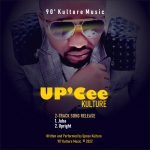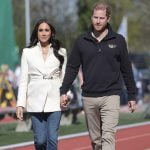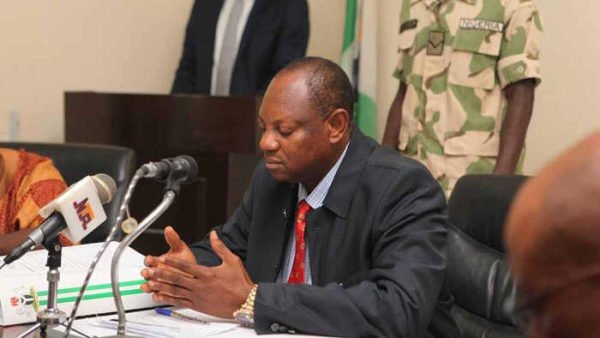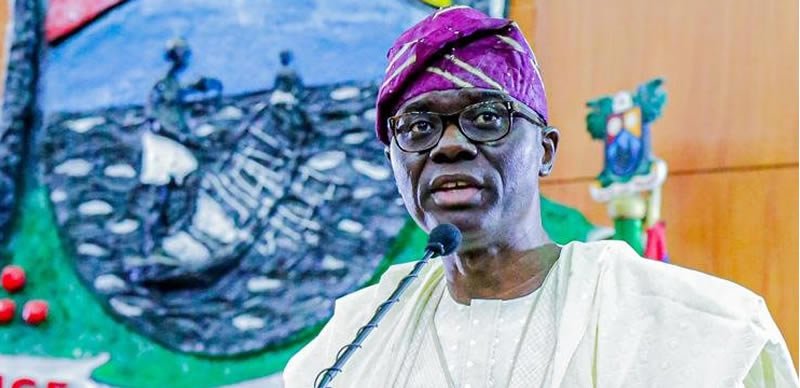After months of avoiding interviews and debates, the presidential candidate of the ruling All Progressives Congress (APC), Bola Tinubu, finally spoke to a news media, the BBC.
The 8.5 minutes-long interview with Peter Okwoché is the first one-on-one interview Mr Tinubu has granted since he declared his intention to succeed President Muhammadu Buhari.
Some people believe that the former Lagos State Governor is avoiding interviews because he is prone to gaffes or is not cognitively fit to articulate his thoughts. And there are also questions about his past; academics, age, source of wealth and allegations of corruption.
His decision to delegate some of the questions asked during a recent Chatham House appearance further strengthened the perception that Mr Tinubu cannot articulate his thoughts. Out of the 10 questions asked by the audience at Chatham House, he answered five and directed some persons in his entourage to answer the rest.
Wale Edun answered the question on employment, Governor Nasir El-Rufai took the question on security, the National Woman Leader of APC, Betta Edu, answered the question on the health sector, Speaker of the House of Representatives, Femi Gbajabiamila, answered the question on the UK/Nigeria defence pact, while Mr Tinubu and Dele Alake answered the question on oil theft.
“@officialABAT not answering questions at his @ChathamHouse chat! He’s asking his aides to respond instead,” Mr Okwoche, who later conducted the BBC interview, had tweeted during the Q and A session.
However, the 8.5 minutes interview appears to have cleared the doubt among many, as even critics agreed that it was a decent interview.
“Tinubu’s BBC interview is by far the closest to coherent he has been since the dawn of campaigns. But even this, being a recorded interaction, is a whitewash,” Fisayo Soyombo, an investigative journalist and critic of Mr Tinubu, had tweeted.
Mr Soyombo added, “Whether with the BBC, CNN, New York Times or NTA, only during a live interview will be able to correctly ascertain his cognitive preparedness for this job he seeks.”
Walking on eggshells on Buhari
Mr Tinubu is promising a “Renewed Hope”, but has to do that without criticising the current administration of Mr Buhari. He is promising to reduce unemployment, a figure that stands at 33.3 per cent under the current administration.
He is promising to reduce poverty, tackle insecurity, and fiscal deficit— all of which have worsened under Mr Buhari. All these he has to do without taking a sling at the current president because he is the candidate of the ruling party and close ally of the president, and because despite the challenges, Mr Buhari remains popular in the northern part of the country.
At any Q and A session, the performance of this administration springs up. And Mr Tinubu is aware that the media is yearning for any hint of criticism of this administration.
While appearing at the Arewa Joint Committee event in October, answering a question on the performance of this administration, Mr Tinubu said he knew of an agenda to pit him against his ‘leader.’
“There are lots of media groups here, there are certain things they are looking for. I am not going to reveal everything. Na lie. I am pitched against my party leader, Buhari. How will I do differently from Buhari? I am different, I am Bola, he is Muhammadu. He has laid a foundation based upon constitutionalism. He has done well.
“Because Buhari is a gentleman, he just absorbs everything. I am going to assure you, I am not going to throw away everything that he has done into the garbage bin. I am going to take the positive area of it. Work on it and build a nation. This country is not about personality, it is about the style that is necessary to fulfil a dream.
“Here, I am not to get up and defend Buhari in one way or the other. He is my party leader. He came with a vision and mission. There are so many of his programmes that are all about Nigeria. We will build on those foundations that are sound and sustainable, …….,” he said at the Arewa House.
During the Q and A session at Chatham House, the performance of the Buhari administration was raised again. In response, he acknowledged that there will be some changes, but he did not criticise the administration.
“I guess my name is Bola Ahmed Tinubu and the current president is Muhammad Buhari. And there is nowhere in the constitution that says a current administration cannot ‘be a continuity’ in their own ways. It does not remove me from adapting to my own economic philosophy and developmental programmes,” he said
Even when Mr Alake answered the question on oil theft and suggested what Mr Tinubu’s administration will do differently, the former Lagos State governor interjected that he would not depart from the administration in classifying both the oil thieves and the receivers as participants in “blood money”.
During the BBC interview again, when the question on the performance of this administration came up, he stated the usual “I am different” line and insisted that he would not abandon his “friend”.
“Buhari has done his best, and I cannot run away from him being my friend and leader in the party. I will not,” he said.
On the three occasions stated in this report, Mr Tinubu ended up using his performance in Lagos State as a reference point.
This walk on eggshells did not start now. Since the beginning of the administration, he has always been careful in speaking on policies.
In 2017, during the presentation of ‘A Mid-term Scorecard on the Muhammadu Buhari Administration’, Mr Tinubu asked the administration to focus on rebuilding the economy.
Mr Tinubu warned that his decision to offer the advice publicly should not be mistaken as evidence of “space” that exists between him and the president. He said such representation would be “ false” and the news about it “will be fake”.
“What I proffer today is done in the spirit of utmost respect and affinity by one who wants the best for this government and for Nigeria. I say these things to encourage the government to achieve the greatness the times demand and of which this government is capable,” he said.
The only direct criticism was during the debate to increase VAT from five per cent to 7.5 per cent in 2019. Even then, Mr Tinubu directed the criticism to his erstwhile protégé, Vice President Yemi Osinbajo.
Let me appeal to Vice President Yemi Osinbajo and his team to put a huge question mark on anything that concerns VAT.
“If we reduce the purchasing power of the people it can further slow down the economy. Let us widen the tax net. Those who are not paying now, even inclusive Bola Tinubu, let the net get bigger and we take in more taxes and that is what we must do in this country,” he said during the colloquium to mark his 67th birthday.
Primary victory and hoping to inherit Buhari’s northern block votes
The APC primary election was a hard-fought battle. At a point, Mr Tinubu even had what many described as a political meltdown in Ogun State, where he went on the famous “Eleyi tirades.”
Since the primaries, Mr Tinubu has stated that he owes his emergence to the political magnanimity of Mr Buhari, who refused to endorse an aspirant during the primaries.
In a letter the APC candidate wrote to Mr Buhari after the primaries, he said “As aspirants and party leaders, we all pleaded with you to ‘choose’ your successor.
“Naturally, this is expected especially in African democracy. Up until the 6th of June, 2022, the day of the APC presidential primaries, the whole of Nigeria, including myself, was waiting for you to announce your preferred candidate. All of us thought and believed this was a very simple matter.”
“Mr President, as the night of 6 June turned to morning of 7 June, I fully understood and appreciated your stance. You belonged to everybody in the party and you belonged to none of the individual candidates of the party. A true leader, brother and friend.”
Also, while presenting his manifesto to the Afenifere in Akure, Ondo State, Mr Tinubu admitted that at a point, he became confused.
“Some people want President Muhammadu Buhari to announce someone but the President said No. He insisted the process must go on democratically. The president said anyone that would mess up the APC process would see the other side of his eyes. He remained upright and saw to the process to the end.
“The battle was tough and at a point, I was in doubt. There were many rumours and I became confused of what to believe.”
Aside from gratitude, Mr Tinubu will need the president in the North, particularly the North-west, the region with the largest voting block. Despite the raging insecurity in the North-west, with bandits and terror groups operating freely, Mr Buhari remains popular.
To emerge victorious in 2023, Mr Tinubu will have to win the North-west geopolitical zone. To this, he will have to defeat two strong candidates from the North, Atiku Abubakar of the Peoples Democratic Party and Rabiu Kwankwaso of the New Nigeria Peoples Party.
Aside from the North-west, Mr Buhari is also politically strong in the North-east. In 2019, Mr Buhari polled 378,076 votes in Adamawa State against the 410,266 votes Atiku, who is from the state, polled.
Other North-east states like Bauchi, Gombe, Yobe and Borno are also Mr Buhari’s strongholds. In these states, Mr Tinubu will be counting on the combined effect of Mr Buhari and Kashim Shettima, his running mate, to deliver.
Any form of criticism against Mr Buhari could well have a negative impact on the poll. However, he will have to sell his “Renewed Hope” amidst worrying economic and security situation.
Perhaps, this could explain Mr Tinubu’s decision to stay away from any debate, as he will have to defend the current administration and even give opposing candidates the opportunity to put him on the spot on the policies of this administration.
Division in APC Northern Christian leaders favours Tinubu
The APC Northern Christian Leaders had one purpose for coming together – punish Mr Tinubu and the APC for fielding a Muslim/Muslim ticket.
Between July and December, the group, headed by a former Secretary to the Government of the Federation, Babachir Lawal, and ex-speaker of the House of Representatives, Yakubu Dogara, declared that it would mobilise Christian voters in the North to vote against the ruling APC.
At the crucial time of making a decision, the camp divided its bloc. Mr Dogara and some others distanced themselves from Mr Lawal’s endorsement of Peter Obi of the Labour Party. Mr Dogara’s camp declared support for the candidate of the PDP, Atiku. With this, even if the aggrieved APC Northern Christian members can mobilise votes, they will share them among Mr Tinubu’s opponents.
In this election cycle, as the candidate of the ruling party, Mr Tinubu’s biggest strength remains the inability of his opponents to unite against him. For instance, Messrs Obi and Kwankwaso were members of the PDP until they left this year.
Mr Obi, who served as running mate to Atiku in 2019, is currently pulling weight in the South-east and South-south, two regions that are traditional PDP strongholds. In Kano and other parts of the North, Mr Kwankwaso is also pulling large crowds.
Aside from the duo, there are also G5 governors led by Governor Nyesom Wike of Rivers State.
These divisions in the opposition are strengthening the chances of the candidate of the ruling party.





2 Comments